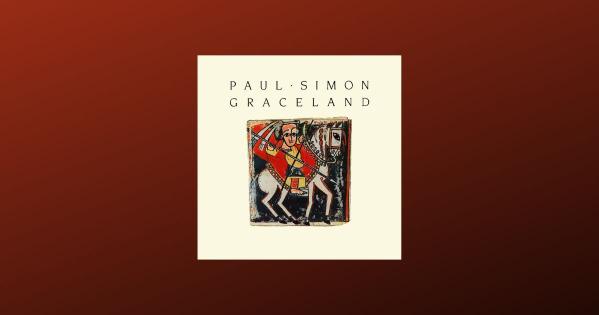Graceland

Welcome to Feature Fridays! In this series, AU Music Library staff highlight items from our collection. This week, Student Assistant Julia Kane reviews Graceland, the 2004 reissue of the 1986 album by Paul Simon.
In the opening pages of the CD insert booklet for Graceland, Paul Simon describes the first time he heard the “gumboots” music that drew him to make this album. Gumboots, he explains, is a South African genre “favored by miners and railroad workers” and named for the heavy boots they wear. It is also called “township jive” or “Mbaqanga;” at its core it is street music meant to be played and enjoyed by everyday people.
After first hearing this music in 1984, Simon began working with a producer based in Johannesburg, South Africa, who familiarized him with artists like Tao Ea Matsekha, Ray Phiri, and the Boyoyo Boys Band, with whom he began collaborating in the spring of 1985. Probably the best known of his collaborators on this album is Ladysmith Black Mambazo, one of the most popular musical groups in South Africa, whom Simon had first encountered when they were featured in a 1977 BBC documentary called “Rhythms of Resistance: The Music of South Africa.”
At the time of Graceland’s creation, the decline of South African apartheid was just beginning. Since 1968, the UN had encouraged economic sanctions against South Africa (to little effect), and in 1980 they instituted a cultural boycott, calling on musicians not to tour in South Africa, among other stipulations for artists, performers, and academics. In fact, Paul Simon received some backlash for breaking the boycott, though his supporters argued that he was supporting Black artists and actively taking an anti-apartheid stance. In 1986, the year the album was released, the US passed the Comprehensive Anti-Apartheid Act, causing many large multinational companies to withdraw from South Africa and signaling the beginning of its economic decline.
While the album doesn’t make any direct political commentaries, the joy of impending liberation and a sense of African pride are audible. Track 7, “Under African Skies,” celebrates the “roots of rhythm,” and Joseph Shabalala contributed lyrics in Zulu for “Diamonds on the Soles of Her Shoes” and “Homeless.” Simon said about the album, “What was unusual about Graceland is that it was on the surface apolitical, but what it represented was the essence of the anti-apartheid in that it was a collaboration between blacks and whites to make music that people everywhere enjoyed.” This theme appears throughout the album, as references to both American and African culture are often blended. The title track, one of the few songs in which both the words and music were written entirely by Paul Simon, focuses on an American landmark but incorporates uniquely African instrumentation, particularly the pedal steel. Additionally, the slightly melancholy feeling of the song feels universal, and the statement that “we all will be received” creates an environment of acceptance.
Another highlight is “Diamonds on the Soles of Her Shoes,” which mingles references to the bodegas of New York City with hand signals used to signal cabs in South Africa. American brass players Earl Gardner, Leonard Pickett, and Alex Foster couple with Ladysmith Black Mambazo’s deep, rumbling backing vocals. Similarly, “Under African Skies” tracks the early musical memories of Joseph Schabalala, Ladysmith’s leader, and Linda Ronstadt, who duets with Paul Simon on this track. Though they are from opposite sides of the Atlantic and have each followed different paths to end up here, their love of music draws them together. At its heart, this is Graceland’s mission- to bring people together across cultural divisions and resist the forces, like apartheid, that would push them apart.
You can explore Graceland further at the Music Library. It even has 3 bonus demo tracks! Dive deeper into Paul Simon with our boxed sets, or browse our sheet music collection to play his music for yourself.
